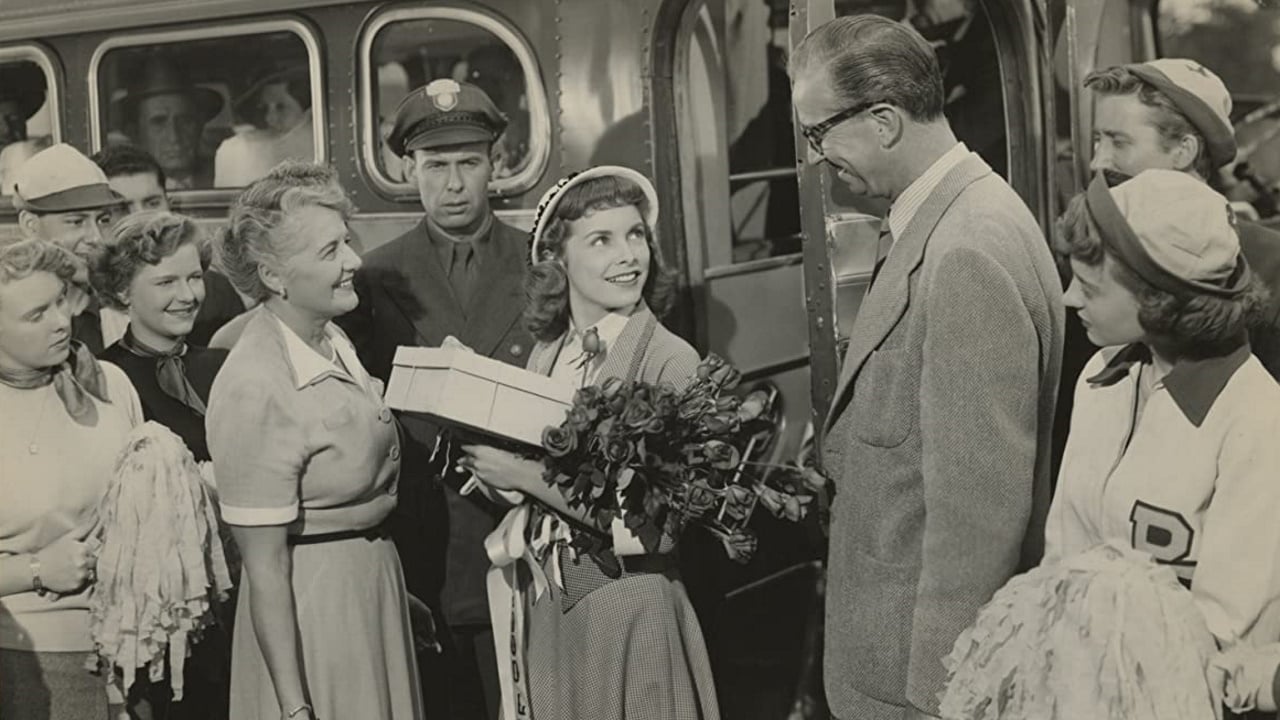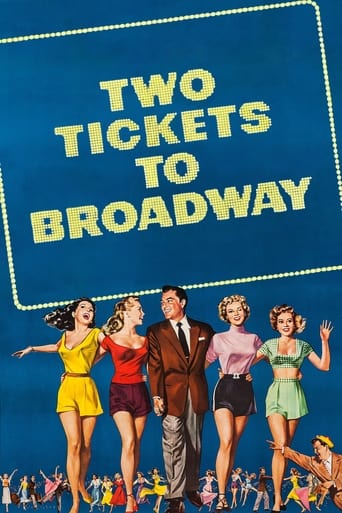

Howard Hughes's line up of acts is basically his way of responding to the other studios' efforts to do the same thing. There are echoes of the Garland/Rooney cycle of musicals from MGM, with a spice of Fox glitz and the good ol' feelin' of well-being from Warners' Doris Day vehicles of a similar period.The only snag is that Hughes did really have any big stars on his payroll. What TWO TICKETS TO Broadway presents is a panoply of would-be leading lights, youngsters on their way to stardom, and imitations of more famous originals such as Bob Crosby who does a specialty number with a cardboard cutout of his more illustrious sibling Bing.Having said that, some of the cast give winning turns. The triumvirate of Janet Leigh, Ann Miller and Gloria DeHaven adumbrate a similar conception in Fox's GENTLEMEN PREFER BLONDES (1953); and they acquit themselves thoroughly well in the song and dance sequences, with Miller getting the chance to show off her famed legs. Tony Martin croons his way through one or two numbers, to the delights of hordes of adoring bobbysoxers. Eddie Bracken camps it up in a largely extraneous comedy role.Yet perhaps the most interesting aspect of James V. Kern's all-star line-up is its inherent structural contradiction that tells us a lot about the contradictions of movie capitalism at the time. The film begins in Garland/ Rooney fashion by suggesting that, given time and talent, anyone can make it big so long as they have the drive and energy to do so, even if they originate from small-town and America and have to travel to New York by Greyhound bus. This is precisely what Leigh, DeHaven and Miller try to do.Yet once they get there, they find that they are very much at the agents' and radio program-makers' mercy. They have to alter their work to suit specific formats, and compromise at every opportunity in line with their employers' requirements. We wonder at this point whether Broadway - like Hollywood - actually values originality, or whether or not both institutions would be much happier with carbon copies of tried and tested formulas.The film does not attempt to answer the question, of course (why should it, when it was planned as a joyful musical), but it reveals an undercurrent of cynicism about the potentially adverse effects of money-making and success.
... View MoreTwo Tickets to Broadway was to be Howard Hughes's answer to MGM type musicals and in fact he engaged the two leads from MGM, Tony Martin and Janet Leigh. The usual criticism was voiced with Martin being 15 years older than Leigh, but in this case it works because part of the plot is fresh faced Ms. Leigh avoiding being taken in by older Broadway sharpies.No memorable songs were written by composers Jule Styne and Leo Robin for this film and that's a pity because if a hit had come out of it, the film would be better remembered. Martin, I'm sure realized no hits were coming out of this and he probably had two of his own songs put in there. He had hit records around this time of the Prologue from Pagliacci and There's No Tomorrow (O Sole Mio). He performs them well. I would love to know if Janet Leigh was dubbed and by who. I don't believe she ever sang in any other film. For that reason I suspect a dubbing if for no other reason that she wouldn't want to be going up against a singer with as powerful a voice as Tony Martin.Ironic that two of the players in this Ann Miller and Janet Leigh died this year. Nobody had to worry about dubbing Ann Miller in any department. She performs her big number, Let the Worry Bird Worry for You in classic style.Bob Crosby who by that time was known as the afternoon Crosby because his radio and later TV show came on in the afternoon unlike his legendary brother. Being the Bing Crosby fan that I am, I have a soft spot in my heart for his Let's Make Comparison where he's comparing himself to brother Bing. Bob led a pretty good jazz band at that time and had a modest career in B films.Eddie Bracken who was so good in his Paramount films was cloying and annoying in this one. His machinations trying to get his clients on the Bob Crosby show were downright stupid here and not terribly funny.The ending though was an unintentional hoot. Janet Leigh comes from Pelican Falls, Vermont and early in the film she's given a send off by the high school band performing their alma mater song. I thought the ending with the high school band, interrupting Bob Crosby's broadcast to reprise their high school song was ridiculous. Was that Howard Hughes's idea? Well he didn't do as much damage here as he did on The Outlaw.The film had a lot of potential and it could have been done better even at RKO, but I suspect Howard Hughes meddled a bit too much here.
... View MoreI hated this film when I first saw it, perhaps thanks to a truly embarrassing performance from Tony Martin (a good singer but not the world's greatest actor). Janet Leigh, Gloria de Haven, and Ann Miller want to make it big in show-business, and come through their vaudeville roots to stage a revue that they hope will be taken up by the Bob Crosby Show. There's some pretty good musical numbers along the way but the film creaks and drags badly in some sections (although the girls are consistently good). Crosby has a number all about 'brother Bing' which is fun. And there's a good support role from Eddie Bracken.On subsequent viewings I have warmed a bit more to 'Two Tickets to Broadway'. It isn't all bad and there are certainly musicals out there which are worse. But I still can't watch Tony Martin in a number in Indian dress without cringing ...
... View MoreA run-of-the-mill musical with Tony Martin and Janet Leigh in the lead roles. Eddie Bracken provides semi-comic relief. You can see the hand of producer Howard Hughes in this one, with its profusion of showgirls and, for 1951, a heaping helping of skin(albeit, G-rated by today's standards).
... View More